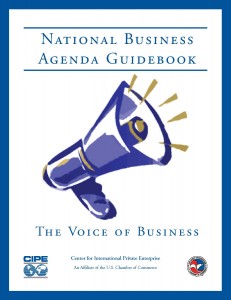A national business agenda (NBA) is a vital tool for the business community to encourage investment and stimulate business activity and economic growth. Developing an agenda mobilizes the business community to use its skills to effect public policy reform by setting legislative and regulatory priorities and clearly communicating them to policymakers.
NBAs identify laws and regulations that hinder business activity. They also offer concrete recommendations and reforms to remove these barriers and improve the business climate.
Developing a national business agenda educates members of the private sector on public policies that affect them. The process allows private sector representatives to present the concerns of the business community to government officials in a unified voice and increase the likelihood that the agenda will be adopted.
Business associations in countries such as Malawi, Nigeria, Paraguay, Peru, Romania, Russia, Montenegro, and the United States have used NBAs to help enact much-needed political and economic reforms. It is a vehicle that can off er solutions to help address problems of corruption, the informal sector, and overregulation.
The key to developing any business agenda is to encourage participation by addressing specific regional and/or industry needs and to provide the business community with a sense of ownership of the final product. The NBA can be national, regional, or industry-based depending on the organizations involved, such as chambers of commerce, professional or trade associations, multi-sectoral, etc.
Business leaders must take the initiative to organize disparate business groups and build a coalition that can reach a consensus on major issues. Freedom of association and the right to petition the government for the redress of grievances are the most basic rights of democratic institutions. Even in emerging democracies it is still possible to influence changes in policy by building grassroots coalitions and a consensus for change.
When business associations come together to promote a core set of market-oriented policies, they are much more effective than if they pursue policy change individually. CIPE developed this guidebook to provide business associations, professional organizations, and other interested parties with step-by-step guidance on how to build a national business agenda. However, the guidebook is to be viewed as a set of guiding principles and can be adapted based on the specific needs of any country’s private sector and the realities of its political process. CIPE’s experience shows that taking a structured approach to reform will often achieve results even in the most challenging of political and economic environments.

